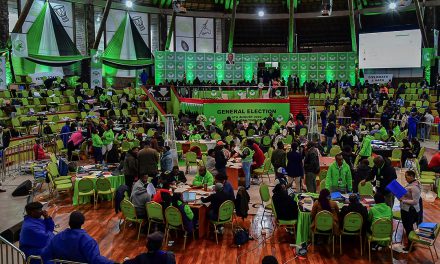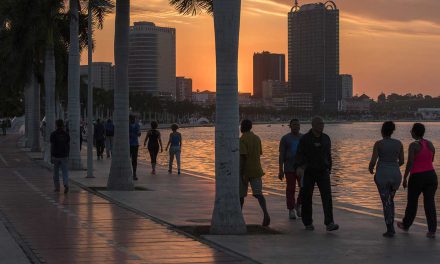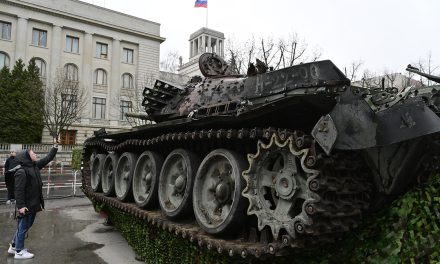MEDIA STATEMENT
FOR IMMEDIATE RELEASE
WASHINGTON – Chris Maroleng, International Chief Executive Officer of Good Governance Africa, has proposed a set of recommendations to the US House of Representatives Committee on Foreign Affairs on improving the US-South Africa relationship.
Addressing the Sub-committee on Africa on Wednesday 27 September, Maroleng said South Africa stood at a crossroads of profound significance: “Having overcome colonialism and apartheid, it now faces two critical new challenges: firstly, finding its place in a world entering a new era of great power competition, and secondly, the post-apartheid state’s susceptibility to opportunistic governance and the mismanagement of the country’s economy.”
The first challenge came from renewed and emerging rivalries between major countries such as China, India, Russia, and the United States, rivalries that would define how the world navigated some of the great challenges of this century: conflict, technological disruption, climate change mitigation, and poverty alleviation.
South Africa remained important to the great powers, being the largest individual trading partner that China, the EU, India, and the US each have on the African continent, while also ranking among the top five African countries in terms of aggregate trade with Russia.
Great powers were therefore seeking South African support, especially over contentious issues.
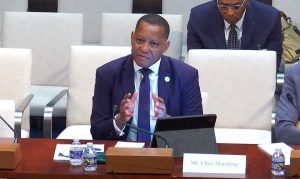
GGA International CEO Chris Maroleng, testifying before the US House of Representatives Subcommittee on Africa.
The relationship between South Africa and the United States, which had faced a series of challenges, leading to a significant deterioration in recent years, stemmed from fundamental differences in foreign policy.
“South Africa’s foreign policy, characterised by non-alignment, contrasts with the United States’ assertive global posture, which is a reflection of its power on the global stage. These differences have been notably evident in key areas.
“The war in Ukraine has been a contentious issue. South Africa’s reluctance to join in international condemnation over Russia’s invasion of Ukraine stands in sharp contrast to the United States’ stance against Russian aggression.
Further complicating matters was South Africa’s growing alignment with China, particularly as a member of BRICS. China’s increasing economic and strategic influence in South Africa has raised concerns in the United States, which views China as a strategic competitor.
A particularly contentious event was South Africa’s decision to host naval exercises with Russia and China in February 2023. This move was met with sharp criticism from the United States, which perceived it as undermining diplomatic efforts to isolate Russia.
The deterioration in relations between Washington and Pretoria was thrown into sharp relief when Ambassador Reuben Brigety alleged that South Africa had supplied arms to Russia in December 2022, using the Russian carrier Lady R.
To date, Ambassador Brigety has yet to offer tangible evidence to validate these claims, but the incident demonstrated the need for the US to maintain protocol, while South Africa needed to carefully manage its ties with China and Russia to ensure they do not come at the expense of relations with other major players such as the United States.
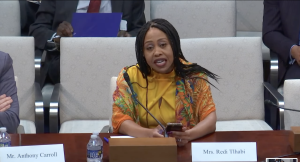
South African journalist and political commentator Redi Thlabi also testified before the committee.
Maroleng said the US has an opportunity to re-imagine its future with not just South Africa but the continent as a whole. South Africa remains an investment opportunity, particularly in infrastructure, and a springboard into the rest of the continent, for US businesses.
“South Africa and the United States have a great deal to offer one another. Both societies place a strong emphasis on human rights, individual liberties, and protecting the rights of our citizens. As our relationship continues to evolve, our shared values and commitment to multilateralism should become the bedrock of our collaboration and partnership on various global issues, all to the mutual benefit of both our great countries,” he said.
Expanding on the second challenge facing South Africa, Maroleng said this concerned the ideological battles within the ruling African National Congress (ANC) and the emergence of anti-democratic politics. There were also concerns about state efficacy, rising crime, and declining health and educational standards.
The state had become a hub for political patronage and cronyism, he said, leading to conflicts with business elites in the private sector. The deterioration of South Africa’s state-owned enterprises (SOEs), especially the failing electricity utility Eskom, threatened political stability and social harmony.
“The ruling elite’s interests, marked by corruption, have resulted in mismanagement and financial instability. The ideological battles in the ANC over the state’s role in the economy arise from resource conflicts, with the greatest challenge being the anti-democratic politics of the emergent kleptocracy,” he said.
Maroleng submitted the following recommendations to the House of Representatives: The US should:
- Focus on direct civil society engagement with South Africa, empowering them in governance and state capacity building.
- Strengthen private sector collaboration between the US and South Africa, fostering economic growth and innovation.
- Transition from aid-centric relations to trade-driven engagements, leveraging opportunities from the African Continental Free Trade Area (AFCFTA).
- Encourage youth participation in South Africa’s democratic future, recognising its challenges as a “choiceless democracy”.
- Enhance people-to-people ties through cultural, educational, and professional exchange programs, fostering mutual understanding and trust.
For further information, contact:
Lloyd Coutts
Director of Publications and Media
lloyd@gga.org
+27-72-7296480
Lloyd Coutts has an extensive background in journalism and media spanning 40 years. He holds a Bachelor of Journalism and Media Studies (Hons) from the University of the Witwatersrand and has worked as a reporter, sub-editor, news editor, assistant editor and acting editor for publications such as Business Day, The Star, Business Report and Sunday World. Lloyd also has experience in wire services, notably the German Press Agency (dpa), and radio (Network Radio News and Classic FM). He also worked in television news at eNCA.



